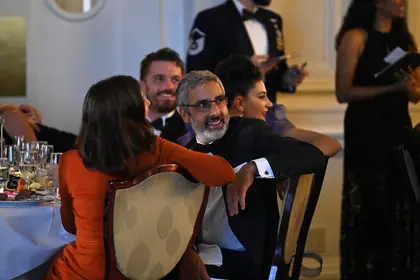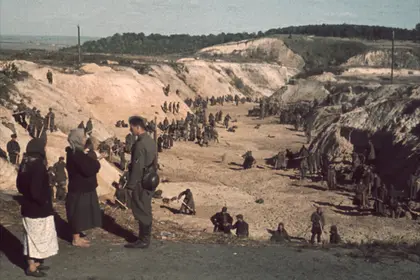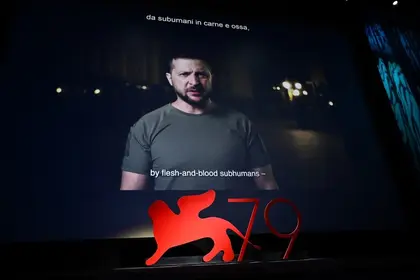Ukraine is a post-Soviet urban oasis beautifully shot by a Canadian crew in “Goodbye Golovin,” this year’s short film winner of the Odesa International Film Festival. But that polished image seems slightly off in a drama about a young man contemplating leaving his home country for good.
Thankfully, there are Ukrainian actors whose genuine portrayal of this internal conflict is as powerful as it is convincing. They’ve been living in Ukraine their whole lives after all.
- Obtain the most current Ukraine news articles released today.
JOIN US ON TELEGRAM
Follow our coverage of the war on the @Kyivpost_official.
There’s not much to the story: The titular character Ian Golovin prepares to go abroad after his father’s death, while leaving his sister and friends behind. For much of the 14-minute film, he wanders around his residential neighborhood meditating on his decision to the beats of hip-hop.
Outwardly, we don’t see much reason for Ian to leave. He lives in a nice apartment, has a cat and a car (I don’t have both, yet here I am, still in Ukraine). He walks around his post-Soviet apartment block that doesn’t seem grey, dirty or crowded at all. It’s green and sun-soaked instead, stylishly shot to emphasize the lines and curves of its architecture.
That’s where the background of the film’s director comes in. Mathieu Grimard’s previous work has been in shooting commercials and music videos. And in filming “Goodbye Golovin,” he seems to follow the aesthetic fancied by his Western colleagues in shooting Ukraine’s post-Soviet landscapes for ads and music reels.

Film Exposes Bloody Protests of Lukashenko Regime
The trend started in 2014, when the Kyiv production service company Radioaktive Film helped British director Daniel Wolfe make the music video for “Iron Sky” by Paulo Nutini.
A number of ads have been shot using these aesthetics in Kyiv by the likes of Diesel, Apple and BMW, and music videos were filmed for pop artists such as Miley Cyrus and K-pop band NCT.
There was even a commercial for Beats Electronics filmed by Guy Ritchie. And it really looks cool.
Yes, cool is the quality that filmmakers seek with this aesthetic. They try to make this post-Soviet architecture look cleaner and more expressive to meet the pop culture demands of their media.
But cool is not the way to go to make a short film drama. In “Goodbye Golovin,” the polished and stylishly shot images of Kyiv do nothing to advance the story. Instead, they make it look more like a music video boxed in some drama.
Grimard also wrote the screenplay to the film, but it doesn’t seem he can really inhabit the lives of his characters. A Canadian probably needs to live many years in Ukraine to write a story about a young Ukrainian man trying to change his identity by going abroad, just as much as a Ukrainian would need to write one about such a Canadian.
Besides, the theme of Ukrainians planning to go abroad has already been powerfully explored in contemporary Ukrainian films, albeit full features.
In Marina Stepanska’s “Falling” (2017), a young woman played by Dasha Plakhtiy almost leaves for Germany with an expat boyfriend, only to be dragged back by a troubled but (newly) sincere Ukrainian young man. There is a similar story in Daria Onyshchenko’s “Zabuti” (2019) with one major difference – its heroes live in a different Ukraine – the Russian-occupied city of Luhansk.
While the external conflict of “Goodbye Golovin” is unconvincing, the film is worth watching for Ian’s internal battles. The credit goes to lead actor Oleksandr Rudinskiy, who was just a student when he gave this electrifying performance. With his expression, Rudinskiy manages to make his character’s monologues a little less pretentious.
From the role of a woman who considers emigrating in “Falling,” actress Plakhtiy switches to the role of Masha, a possible love interest who tries to convince Ian to stay. It’s a solid performance, and a compliment goes to Plakhtiy and Grimard for making Masha at least one Ukrainian-speaking character in the film, while the rest speak Russian.
The film’s strongest line, informed by the filmmaker’s life, comes from her lips: “You think by changing the audience, we can change who we are?”
No. And we can’t change the audience with a film about what we are not.
This story was produced within the Intensive Course for Film Critics organized by the Contemporary Ukrainian Cinema NGO. The content is independent of the organizers.
You can also highlight the text and press Ctrl + Enter











